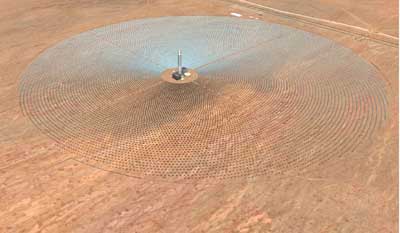Desertec is a massive project to to build solar thermal plants in the deserts of North Africa — you know, the same North Africa that had all the revolutions just now. But proponents are saying there’s no reason to put the project on hold just because of political unrest. In fact, they say, the economic benefits afforded by the Desertec plant might help the region in its shift towards democracy.
The plants would take advantage of the Sahara’s sunshine — it gets so much that covering only 1 percent of its area in solar thermal plants could power the entire world — and would be able to supply one-sixth of Europe’s electricity. Exporting to Europe would spur economic development, promoting the kind of stability the region requires, energy expert Kristen Westphal told Der Spiegel.
That’s led some to accuse Desertec of having a neocolonialist agenda — Europeans using African land to produce energy for Europe. But the project will also mean a local source of renewable energy for North Africa and the Middle East, both of which have populations growing well in excess of other parts of the world. Having an energy source and an income source from Desertec could shore up new democracies, Westphal says.
Of course, that assumes that the project ever gets off the ground in the first place. Given its enormous price tag ($566 billion) and the challenges of building a trans-oceanic transmission infrastructure, it seems just as likely that the falling price of solar panels would mean utilities would seek renewables closer to home.



